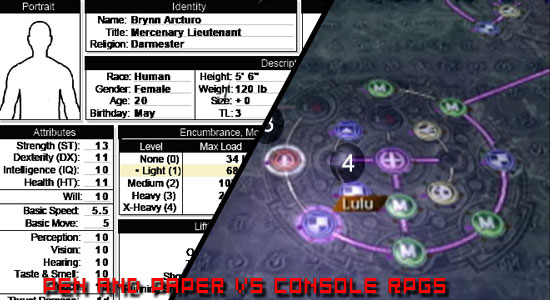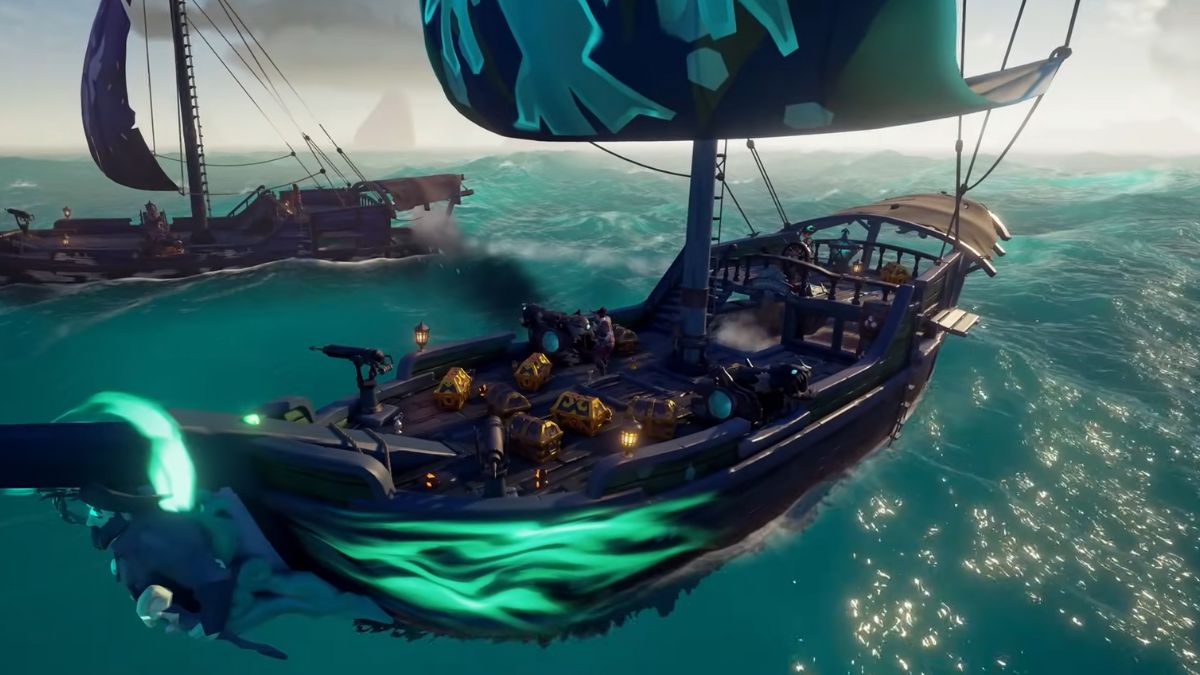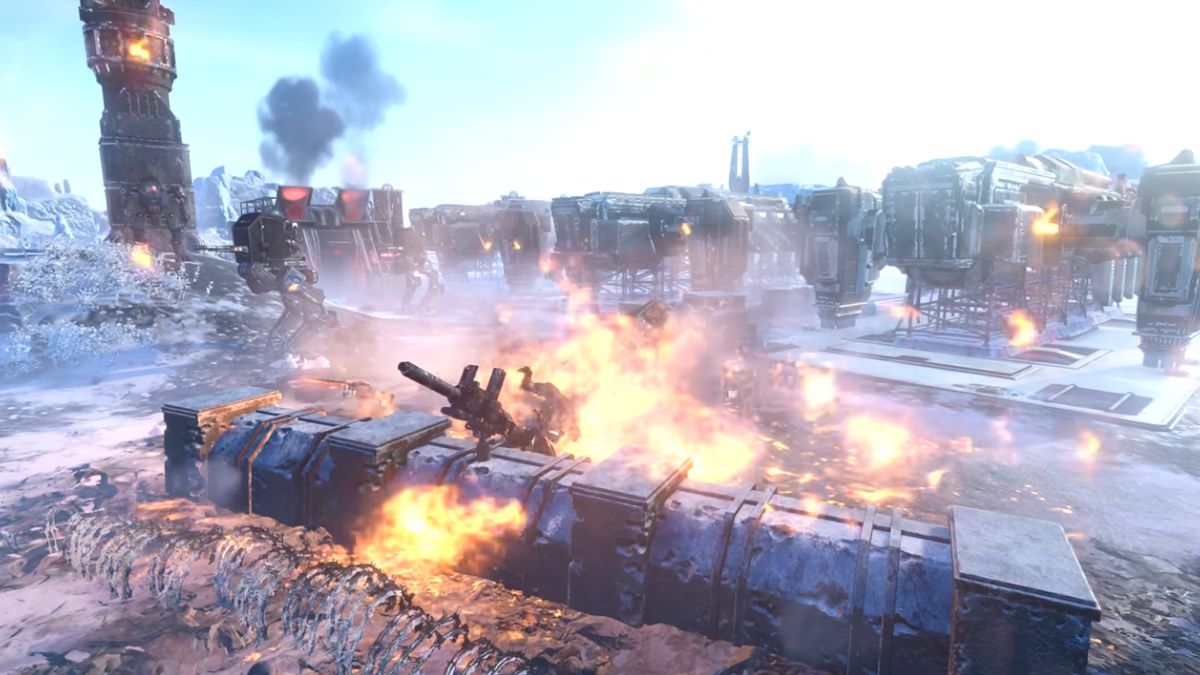Last week, I talked about the difference in storytelling and feeling between pen and paper RPGs and console RPGs. This week, I’m going to be talking about system mechanics and gameplay for the two.
There’s something to be said for both of them. With pen and paper games, situations can go in your favor or utterly crush you at a totally random moment. Meanwhile, console games will usually keep you in a more central position, with things usually going as planned — unless, of course, the enemy does something really off the wall. Then, we just start screaming “h4x!” at the screen.
So, let’s get crackin’ on what makes these two systems tick.
First, let me tackle pen and paper games, as they are the more capricious beast here. There are two things that everything revolves around: your GM, and your dice.

The dice are whimsical — they allow you to survive, and even win difficult battles with relative ease, only to punish you later by having you take massive amounts of damage at a critical moment. My most recent RP session is a good example of this:
The party was off to fight a drake that was currently attacking our ships (I had just paid for 1,000 slaves, so I’ll be damned if some drake is going to kill them) after our archer managed to shoot it in the eye. It retired inside the mouth of a volcano, and so up we went to take it out for good. Rhaegar and Brynn, belonging to my friend and I, jumped down to kill the drake by impaling it. We manage to do some good damage initially, but after it started fighting back, our rolls just went to shit. We both critically failed a dodge, which meant the drake did maximum damage to us when it took a bite out of us. Needless to say, that wasn’t good.
Well, after falling into the lava below, the GM was kind enough to finally grant us the fiery wings that we had been asking for. My point is this, though — the dice can be incredibly unforgiving. There are times when you’ll consistently roll horrific numbers that will just screw you over in a situation, and there’s no reset button. You just have to deal with what gets dealt to you.
That’s one of the things you have to realize about an RPG — just because you get screwed over doesn’t mean you can try again. Sometimes, your character will die, and the game will just keep going. All that work that you’ve put into a character can be gone, depending on the situation. Once again, take my GM for example. He wasn’t going to kill Rhaegar and Brynn because of some bad dice rolls. Yet, he did kill off a character in a previous campaign due to the fact that, instead of running away from a giant monster, he decided to moon it. He even double checked with him that it was what he wanted to do. So, utter stupidity can get you killed, but not necessarily.

Now, that brings me to the GM. Depending on who you and your friends put in charge, he can either be kind and fair (like my GM), or he can be a total dick who will try to screw over the party at every chance. There are a ton of GMs out there like this, sadly. The GM allows you to be someone to argue with and protest when you think situations don’t work properly, or when something seems to be unfair. The GM is also there to shut down power-gamers, or people who build their character to take advantage of loopholes in the rules and become insanely powerful. Hell, you could include several chapters of The Guide to Recognizing Your Gamers on pen and paper stereotypes alone.
Anyways, GMs are there to mold the story around the player’s actions — you’re both working to tell a complete story. The relationship between the two can be interesting, as sometimes a GM will guide a player towards his wishes, because it accomplishes another plan for the GM. Other times, the GM will keep trying to stop a player from achieving a goal, perhaps because the player just keeps asking for something constantly. It tends to be a back and forth between the two, but it allows for a certain level of fairness for the player over the console games.
So, like I said, console RPGs are more centrally located on the plain of fairness when it comes to gameplay and system mechanics. You’re following a more singular story, so the game is not going to punish you for taking too long to explore a certain area or screw you over with a critical failure when you go to climb up a cliff, severely injuring you.

Combat, I think, proves to be more of a challenge in console RPGs, because you’re put on a more equal playing field with your enemies. With pen and paper battles, challenging fights are rarer, and might only happen once per session. Otherwise, it’s akin to just fighting those annoying little bat enemies when running through a dungeon — the ones that barely give any XP.
There are times, of course, when the enemy inexplicably goes for several turns in a row and proceeds to destroy your party. Then, it’s fair to chuck your controller in fury, and hit the reset button. That’s the thing, though. You have the ability to reset the situation if it turns out unfavorably, and give it another shot.
There’s a bigger restriction, for the most part, in console RPGs as to how your characters grow, but that seems to be something that’s slowly getting phased out. The sphere grid system in Final Fantasy X and the job system from Final Fantasy Tactics both allowed for players to develop characters that better suited their needs, as opposed to just leveling up. At the same time, this system prevented power-gaming, by not including some things that can be combined to create devastating effects (except for glitches, like the Excalibur one in FFT).
While I spent more time talking about pen and paper games, I think console RPGs provide a more fair and balanced experience by themselves. Including the fairness of the GM is a variable into the whole system, because it varies as to how lenient they will be with changing a situation to be more/less fair, or if they’ll be willing to throw out rules because they don’t work or are broken. Console RPGs have all of that worked out, and by hiding some of the mechanics of the game, allow for things to run more smoothly and more enjoyably. In this case, the advantage is more towards console RPGs.
Stay tuned for next week, when I’ll answer all of your questions and issues. Please be sure to ask away in the comments.




